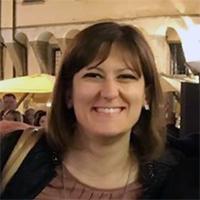Department of Biotechnology and Biosciences BtBs
BtBs seminar - Breaking the limits in understanding glycan recognition by NMR
Jesus Jimenez-Barbero, CIC bioGUNE - Thursday 17 October 2024, 4:30 pm, U3-BIOS building, room U3-08
Di Mise Annarita, PhD
Assistant Professor of Physiology
Image

Keywords
Calcium signaling, cAMP signaling, Cardiovascular Physiology.
DiMise's Lab – #DiMiseLab_BtBs
last update: October 2024
BtBs seminar - Integrative Antibody Discovery for Challenging Protein Aggregates.
Francesco Aprile, Department of Chemistry, Faculty of Natural Sciences, Imperial College London - Thursday, October 10, 2024, 4:30 p.m., U3-BIOS building, room U3-08
BtBs seminar - Targeting of G protein-coupled receptors (GPCRs) V2R and CaSR for treating Autosomal Dominant Polycystic Kidney Disease.
Annarita Di Mise, Department of Biotechnology and Biosciences - University of Milano-Bicocca - Thursday 3 October 2024, 4:30 pm, U3-BIOS building, room U3-08
BtBs seminar - Nanoparticle- Based Delivery of Biological Drugs: Applications and Perspectives
Lucia Salvioni, Department of Biotechnology and Biosciences - University of Milano-Bicocca - Wednesday, September 25, 2024, 4:30 p.m., U4-TELLUS building, room U4-01
Porte aperte alle matricole!
Il Dipartimento di Biotecnologie e Bioscienze accoglie i nuovi iscritti ai Corsi di Laurea triennali e magistrali del Dipartimento secondo il seguente calendario:
Memorial Lecture in memory of Roberta Fraschini
Simonetta Piatti, Centre de Recherche en Biologie Cellulaire de Montpellier (CRBM), Montpellier, France - Monday 23 September 2024, 10:00, Sironi Room (U4-08), Building U4
BtBs seminar - Signalling architecture underlying breast cancer cell motility
Chiara Francavilla, Technical University of Denmark and The University of Manchester - Thursday 12 September 2024, 4:30pm, building U3-BIOS, room U3-08